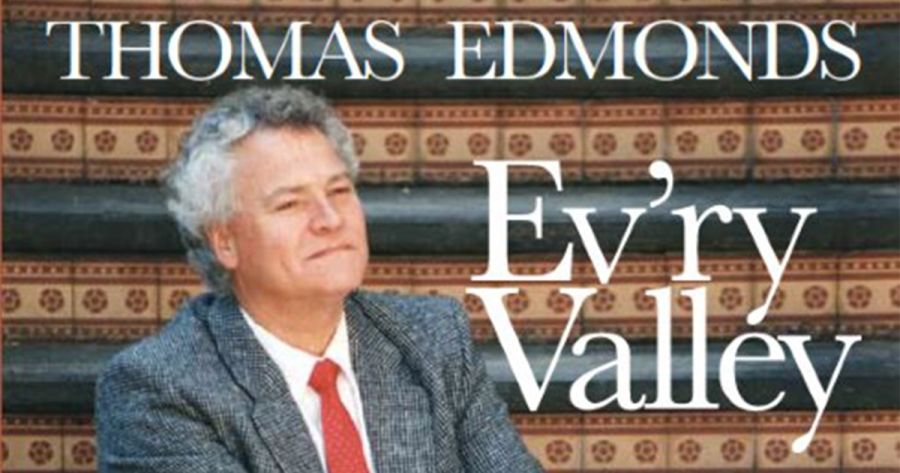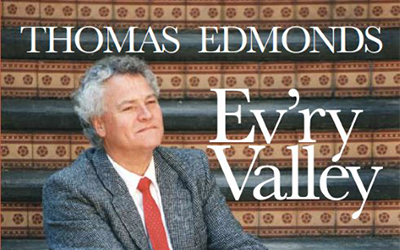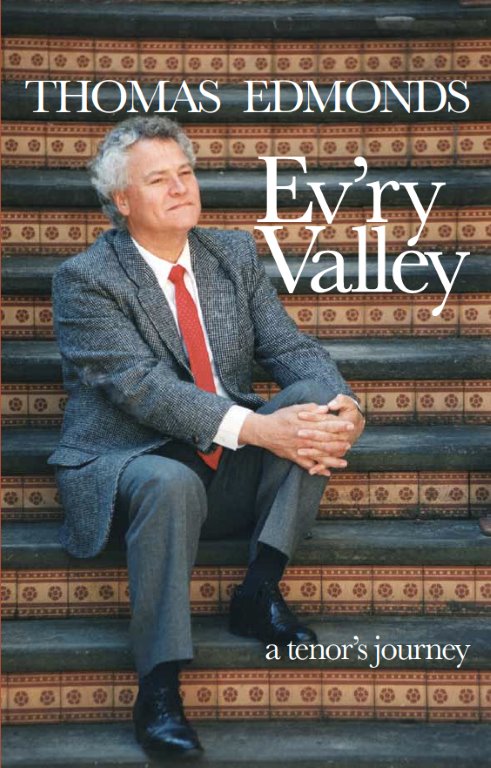
- Free Article: No
- Contents Category: Music
- Review Article: Yes
- Article Title: Bright-toned tenor
- Article Subtitle: The boy from Yongala
- Online Only: Yes
- Custom Highlight Text:
One of Australia’s most successful tenors and in his ninetieth year, Thomas Edmonds has put pen to paper in what might be his swansong. Ev’ry Valley: A tenor’s journey is a prodigiously detailed account of his life, and quite a marvel for what it contains. All his memories and ruminations are contained in its 313 pages, and the book is arranged in a most unusual way: by abode. A singer’s life is on the road, one might say, and this has surely been the case with Edmond. No less than thirty addresses are the subject of each of its chapters, starting in rural South Australia where he grew up, expanding geographically as he went on to win a talent quest television program in the 1960s, and reaching further career heights in the United Kingdom in the 1970s.
- Featured Image (400px * 250px):

- Alt Tag (Featured Image): Graham Strahle reviews ‘Ev’ry Valley: A tenor’s journey’ by Thomas Edmonds
- Book 1 Title: Ev’ry Valley
- Book 1 Subtitle: A tenor’s journey
- Book 1 Biblio: Openbook Howden, $39.99 pb, 313 pp
- Book 1 Cover Small (400 x 600):

- Book 1 Cover (800 x 1200):

Bright-toned vocally on stage, and almost indestructibly optimistic in character, Edmonds is an interesting figure to read about. The qualities that have made him superlative in Mozart, Handel, and Britten are the same ones that come through in every aspect of his life. He tells his story in plain language like the honest farmer’s boy that comes through in the early chapters: doing good by his family, helping to pay the bills, and wanting to fulfil his potential.
Ev’ry Valley is written in workaday language, sans literary flourish, but with a wisdom and attitude to life that inspires the reader to follow each of the changing fortunes in Edmonds’s career. Indeed, Handel’s tenor aria in Messiah, from which the book derives its name, might as well have been written for him. We have here a tale about how simple hard work and firm values render every mountain low, every crooked road straight, and every rough place smooth. He must have sung this aria countless times – famously at London’s Royal Albert Hall during the 1980s – and its words ring true for his life story.
One sees how formative was his upbringing on the family farm near Peterborough, in South Australia’s mid-north. Facing hardship during World War II, the Edmonds family had to catch pigeons to eat and sell firewood and eggs to earn money. Meantime, young Thomas made a name for himself singing in local charity events and competitions. His fortitude and likeableness were in his favour, along with vocal talent.
Setting the wheels in motion was Edmonds’s great success in Showcase, the national talent quest program aired on commercial television. Auditioning in 1968 with ‘The wand’ring minstrel’ from Gilbert and Sullivan’s The Mikado, and winning public favourite for his début, he was now Australia’s most charismatic tenor.
In reality, equally testing battles were to lie ahead. After setting off for the United Kingdom in 1970 in search of further opportunity, things proved as tough as they had ever been. Desperately seeking lodgings in London, Edmonds describes how he sang ‘Danny Boy’ to an Irish landlord to find a place to stay. He succeeded.
Failing his first BBC audition was another obstacle, but he overcame this with equal tenacity. Next, he was singing in Death in Venice with a vocal group that Benjamin Britten had formed twenty-five years earlier, namely The English Opera Group, and performing with them at Snape Maltings at Aldeburgh, and later at the Edinburgh Festival and Venice’s La Fenice.
It was during rehearsals for Death in Venice that Edmonds met Britten. Such an encounter would justify attention, yet Edmonds deals with it as routine stuff for a young singer doing their job. His unglossed account of their meeting wins prizes for honesty. So too do his descriptions of funnier, and sometimes alarming, events during his time in the United Kingdom. On one occasion, while singing for BBC radio, the studio was deluged in a rainstorm (‘the musicians literally waded out carrying their instruments above their heads’). On another, a massive lighting girder fell onto the stage and nearly killed the singers.
While in Britain, Edmonds made several return trips that cemented his reputation on these shores. One was to sing Janáček’s ‘The Excursions of Mr Brouček’ in 1973 with New Opera in South Australia, predecessor of State Opera South Australia. We gain fascinating insights into a burgeoning local arts scene at this time, both in his recollections of performing in Tippett’s The Midsummer Marriage, Death in Venice, and Janáček’s The Makropulos Affair at the Adelaide Festival (with Elisabeth Söderström in the title role), and in his numerous appearances with State Opera SA in the years following. By now permanently back in Australia, Edmonds was pursuing an equally busy schedule with the Australian Opera, and his final appearances with that company notably included taking the role of Tito in Mozart’s La clemenza di Tito under Christopher Hogwood in 1988. His remarks on Stuart Challender’s gestural style of conducting in Verdi’s Macbeth are noteworthy.
Later chapters tell us how Edmonds made a brave decision to retire early, in his mid-forties, and spend more time with his family and pursue other interests. Again, his honesty shines through, and it is a pleasure to see how the ‘boy from Yongala’, as he calls himself, has found a quiet, peaceful existence with his wife, Elizabeth Campbell – herself another of Australia’s most celebrated opera singers – in their leafy idyll at Mount Barker in the Adelaide Hills.
This book is the more valuable for eight concluding essays in which Edmonds shares some of his more personal views. His essays on Bach’s choral works and Handel’s Messiah convey an enduring love and knowledge of this music. Another, on ‘Critics’, offers a wonderfully frank and lively assessment of the contribution made by critics.
A lifetime of thought and achievement between its covers, Thomas Edmonds’s memoir deserves a place in every opera lover’s library.


Comments powered by CComment